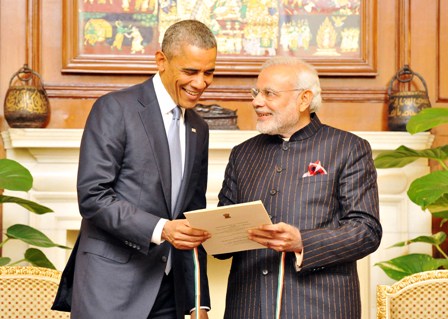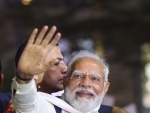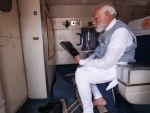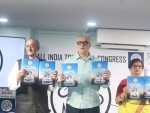
Obama, Modi assess bilateral strategic and global partnership
Obama, accompanied by First Lady Michelle Obama, is visiting India from Jan 25-27. Obama is the Chief Guest at India`s 66th Republic Day celebrations. He is the first U.S. President to grace this historic event.
Noting that the multifaceted partnership between the United States and India is rooted in shared values of democracy and strong economic and people-to-people ties, Obama and Modi elevated the bilateral relationship through their endorsement of a new India-U.S. Delhi Declaration of Friendship, which builds on their Sept 30 Vision Statement by articulating tangible principles to guide ongoing efforts to advance mutual prosperity, a clean and healthy environment, greater economic cooperation, regional peace, security and stability for the larger benefit of humankind.
Recognizing the important role that both countries play in promoting peace, prosperity, stability and security in the Asia-Pacific and Indian Ocean Region, and noting that India’s ‘Act East Policy’ and the United States’ rebalance to Asia provide opportunities for India, the United States, and other Asia-Pacific countries to work closely to strengthen regional ties, the Leaders announced a Joint Strategic Vision to guide their engagement in the region.
The Prime Minister and the President acknowledged and expressed satisfaction at the qualitative reinvigoration of strategic ties and the intensity of substantive interactions since the Prime Minister`s visit to Washington in September 2014.
Modi and Obama jointly appreciated the significant efforts undertaken by both sides in recent months to re-energize the strategic partnership, and affirmed expanding the substantive underpinnings of our diversified bilateral strategic partnership including through expanded strategic consultations, stronger defence, security, and economic cooperation.
Obama also reiterated his support for Modi`s vision to transform India, and recognized that India`s focus on its development priorities presented substantial opportunities for forging stronger India-U.S. economic ties and greater people-to-people contacts.
"Reaffirming that India’s rise is also in the interest of the United States, regional and global stability, and global economic growth, President Obama reiterated the United States` readiness to partner with India in this transformation. The two leaders pledged to translate their commitment of 'Chalein Saath Saath': 'Forward Together We Go" of September into action through 'Sanjha Prayaas; Sab Ka Vikaas': 'Shared Effort; Progress For All'," said a Joint Statement issued on Sunday.
Modi and Obama expressed confidence that continued bilateral collaboration will increase opportunities for investment, improve bilateral trade and investment ties and lead to the creation of jobs and prosperity in both economies.
"In this regard, the Leaders agreed to continue to strengthen their broad-based partnership for development through stronger trade, technology, manufacturing, and investment linkages between the two countries and triangular cooperation with partner countries, and that continued efforts to maintain labor standards as per domestic law and agreed international norms will make these linkages more durable. The two sides also committed to continuing to cooperate on the finalization of the Post-Bali Work Programme in the spirit of the Doha mandate," read the statement.
The President and the Prime Minister affirmed their shared commitment to facilitating increased bilateral investment flows and fostering an open and predictable climate for investment. To this end, the Leaders instructed their officials to assess the prospects for moving forward with high-standard bilateral investment treaty discussions given their respective approaches.
The President and the Prime Minister also welcomed the fifth annual U.S.-India Economic and Financial Partnership Dialogue in February, in which the countries will deepen their dialogue on macroeconomic policy, financial sector regulation and development, infrastructure investment, tax policy, and efforts to combat money laundering and terrorist financing.
The two sides agreed to hold a discussion on the elements required in both countries to pursue an India-U.S. Totalisation Agreement.
Obama commended Prime Minister Modi’s "Jan Dhan” scheme to prioritize financial inclusion for India’s poor.
The leaders noted India’s intent to join the Better Than Cash Alliance.
The leaders committed to explore areas of collaboration in skill development ranging from establishing quality assurance systems for skilling certification standards, setting up of skill development centres, nurturing and promoting social entrepreneurship and strengthening the innovation and entrepreneurship ecosystem.
Obama and Modi agreed to collaborate in the implementation of India`s ambitious Digital India programme and expand commercial cooperation, including by encouraging investment engagement in the Information and Communication Technology (ICT) sector.
In recognition of the importance of their ongoing commercial discussions, the two sides agreed to hold public-private discussions in early 2015 under the aegis of the India-U.S. Commercial Dialogue for a period of two years, until March 2016, on mutually agreed areas of cooperation.
Recognizing the progress made in constructive engagement on Intellectual Property under the last round of the India-U.S. Trade Policy Forum held in November, 2014, the Leaders also looked forward to enhancing engagement on Intellectual Property Rights (IPR) in 2015 under the High Level Working Group on Intellectual Property, to the mutual benefit of both the countries.
Acknowledging the potential for technological cooperation in the rail sector in augmenting and optimizing India`s rail infrastructure, the Leaders agreed to facilitate U.S. Trade and Development Agency and Indian Railways technical cooperation that will assist Indian Railways’ efforts to modify its leasing and public-private partnership frameworks to attract private sector funding.
The Leaders recognized the robust public-private U.S.-India civil aviation partnership and agreed to continue working together to identify emerging technologies and build a larger commercial engagement agenda through key events such as the 2015 U.S.-India Aviation Summit and demonstration of advanced U.S. technologies.
Reaffirming their commitment to safety and security of civil aviation, the United States and India will continue consultations between the Federal Aviation Administration (FAA) and the India Directorate General of Civil Aviation (DGCA) to ensure international safety standards set by the International Civil Aviation Organisation (ICAO), with the aim of restoring Category I status at the earliest possible time.
Noting the importance of ongoing cooperation in higher education, the President and Prime Minister welcomed ongoing efforts to extend a knowledge partnership for supporting the Indian Institute of Technology at Gandhinagar through USAID. President Obama and Prime Minister Modi also pledged to collaborate through India`s Global Initiative of Academic Networks (GIAN), to facilitate short-term teaching and research programs by up to 1000 visiting U.S. academics in Indian universities.
The Leaders emphasized the importance of strengthening international financial institutions, including the International Monetary Fund.
The President also affirmed his commitment to enhancing India`s voice and vote in international Financial Institutions and ensuring that resources are made available and used creatively through multilateral development banks for infrastructure financing.
Prime Minister Modi appreciated the efforts of the U.S. Treasury for cooperating with the Ministry of Finance on the Task Force on Resolution Corporation set up in pursuance of the recommendations of the Financial Sector Legislative Reforms Commission.
Modi and Obama reaffirmed their commitment to ensure that partnerships in science, technology and innovation are a crucial component of the overall bilateral engagement in the 21st century.
They also reaffirmed their support for the role that science, technology and innovation partnerships can play in addressing pressing challenges in areas such as food, water, energy, climate, and health and developing innovative solutions that are affordable, accessible and adaptable, meet the needs of the people of the two countries and benefit the global community.
To this end, the Leaders agreed to continue to develop cooperative efforts in many areas of science, technology, and innovation, including studying the impacts of water, air pollution, sanitation and hygiene on human health and well-being.
The Leaders also agreed to continue U.S.-India collaboration in hydrology and water studies and monsoon modelling and noted the need to expeditiously work towards launching an Indo-U.S. Climate Fellowship to facilitate human capacity building.
The Prime Minister and the President also reaffirmed the importance of ongoing efforts to strengthen women`s participation in science, technology, engineering, and math through networking and mentoring programs.
The President and the Prime Minister welcome efforts, under the bilateral High Technology Cooperation Group, to seek timely resolution of the challenges to trade in High Technology goods, including the U.S. licensing requirements for trade in certain dual use items.
The Leaders reaffirmed the importance of providing transparent and predictable policy environments for fostering innovation.
Both countries reiterated their interest in sharing information and best practices on IPR issues, and reaffirmed their commitment to stakeholders’ consultations on policy matters concerning intellectual property protection.
Obama and Modi agreed to further promote cooperative and commercial relations between India and the United States in the field of space.
The leaders noted the on-going interactions between their space agencies, including towards realizing a dual frequency radar imaging satellite for Earth Sciences, and exploring possibilities for cooperation in studying Mars.
The Leaders took note of ongoing U.S.-India space cooperation, including the first face-to-face meeting of the ISRO-NASA Mars Working Group from 29-31 January 2015 in Bangalore, in which the two sides will consider opportunities for enhanced cooperation in Mars exploration, including potential coordinated observations and analysis between ISRO’s Mars Orbiter Mission and NASA’s Mars Atmosphere and Volatile EvolutioN mission (MAVEN). The Prime Minister and the President also welcomed continued progress toward enhanced space cooperation via the U.S.-India Civil Space Joint Working Group, which will meet later this year in India.
Under the umbrella of an implementing agreement between the U.S. Department of Energy and the Department of Atomic Energy of India, the Leaders welcomed expanded collaboration in basic physics research, and accelerator research and development.
The Leaders reaffirmed their commitment to the Global Health Security Agenda (GHSA) and announced specific actions at home and abroad to prevent the spread of infectious diseases, including a CDC-Ministry of Health Ebola and GHSA preparedness training, expansion of the India Epidemic Intelligence Service, and development of a roadmap to achieve the objectives of the GHSA within three years.
The Leaders also committed to multi-sectoral actions countering the emergence and spread of antimicrobial resistance (AMR), and cooperation in training of health workers in preparedness for infectious disease threats. The Leaders agreed to focus science and technology partnerships on countering antibiotic resistant bacteria and promoting the availability, efficacy and quality of therapeutics.
The Leaders welcomed further progress in promoting bilateral cooperation on cancer research, prevention, control, and management and agreed to continue to strengthen the engagement between the CDC and India’s National Centre for Disease Control.
The President and Prime Minister also welcomed the upcoming completion of an Environmental Health, Occupational Health and Injury Prevention and Control MoU between the U.S. Centers for Disease Control and Prevention and the Indian Council for Medical Research to further collaborative efforts to improve the health and welfare of both countries’ citizens.
The Prime Minister and the President also agreed to expand the India-U.S. Health Initiative into a Healthcare Dialogue with relevant stakeholders to further strengthen bilateral collaboration in health sectors including through capacity building initiatives and by exploring new areas, including affordable healthcare, cost saving mechanisms, distribution barriers, patent quality, health services information technology, and complementary and traditional medicine.
The President and the Prime Minister pledged to encourage dialogue between the U.S. Department of Health and Human Services and its Indian counterparts on traditional medicine. The Leaders also pledged to strengthen collaboration, dialogue, and cooperation between the regulatory authorities of the two countries to ensure safety, efficacy, and quality of pharmaceuticals, including generic medicines.
The Leaders also agreed to accelerate joint leadership of the global Call to Action to end preventable deaths among mothers and children through a third meeting of the 24 participating countries in India in June 2015. As host, India will showcase the power of new partnerships, innovations and systems to more effectively deliver life-saving interventions.
They also lauded the highly successful collaboration on a locally produced vaccine against rotavirus which will save the lives of an estimated 80,000 children each year in India alone, and pledged to strengthen the cooperation in health research and capacity building through a new phase of the India-U.S. Vaccine Action Programme.
Modi and Obama welcomed the efforts made by both sides to expand bilateral defence cooperation in areas of mutual interest and reaffirmed their commitment to continue to work towards deepening the bilateral defence relationship.
The Leaders acknowledged bilateral military ties as the foundation of the defense relationship and encouraged their respective militaries to pursue additional opportunities for engagement through exercises, military personnel exchanges, and defense dialogues.
The Leaders also acknowledged the need for the two-way defence engagement to include technology cooperation and collaboration, co-production and co-development.
To this end, the President and the Prime Minister emphasized the ongoing importance of the Defence Technology and Trade Initiative (DTTI) in developing new areas of technology cooperation in the defence sector including through co-development and co-production and the Prime Minister welcomed the U.S. Defense Department’s establishment of a dedicated rapid reaction team focused exclusively on advancing DTTI.
The Leaders expressed confidence that continued DTTI collaboration will yield additional joint projects in the near future.
The President also welcomed the Prime Minister`s initiatives to liberalize the Foreign Direct Investment Policy regime in the defence sector and the Leaders agreed to cooperate on India`s efforts to establish a defence industrial base in India, including through initiatives like `Make in India.`
Modi and Obama expressed satisfaction over the efforts made by both countries to deepen cooperation in the field of maritime security, as reflected in the 2015 Framework for the U.S.-India Defense Relationship.
To this end, they agreed that the navies of both sides would continue discussions to identify specific areas for expanding maritime cooperation. They also reiterated their commitment to upgrading their bilateral naval exercise MALABAR.
The two sides also noted the growing cooperation between their law enforcement agencies, particularly in the areas of extradition and mutual legal assistance, to counter transnational criminal threats such as terrorism, narcotics, trafficking, financial and economic fraud, cybercrime, and transnational organized crime and pledged to enhance such cooperation further.
The President and the Prime Minister also noted the serious risks to national and economic security from malicious cyber activity and agreed to cooperate on enhancing operational sharing of cyber threat information, examining how international law applies in cyberspace, and working together to build agreement on norms of responsible state behavior.
The Leaders committed to undertake efforts to make the U.S.-India partnership a defining counterterrorism relationship for the 21st Century by deepening collaboration to combat the full spectrum of terrorist threats and keep their respective homelands and citizens safe from attacks.
The Leaders reiterated their strong condemnation of terrorism in all its forms and manifestations with ‘zero tolerance’ and reaffirmed their deep concern over the continued threat posed by transnational terrorism including by groups like Al Qaida and the ISIL, and called for eliminating terrorist safe havens and infrastructure, disrupting terrorist networks and their financing, and stopping cross-border movement of terrorists.
The Leaders reaffirmed the need for joint and concerted efforts to disrupt entities such as Lashkar-e-Tayyiba, Jaish-e-Mohammad, D Company and the Haqqani Network, and agreed to continue ongoing efforts through the Homeland Security Dialogue as well as the next round of the U.S.-India Joint Working Group on Counter Terrorism in late 2015 to develop actionable elements of bilateral engagement. The two sides noted the recent U.S. sanctions against three D Company affiliates.
The President and the Prime Minister further agreed to continue to work toward an agreement to share information on known and suspected terrorists. They also agreed to enter discussions to deepen collaboration on UN terrorist designations, and reiterated their call for Pakistan to bring the perpetrators of the November 2008 terrorist attack in Mumbai to justice.
The President and the Prime Minister also noted the positive cooperative engagement between the Indian and the U.S. authorities with a view to working together to counter the threat of IEDs and to develop counterterrorism best practices.
Energy and Climate Change Noting that the Contact Group set up in September 2014 to advance implementation of bilateral civil nuclear cooperation has met three times in December and January, the Leaders welcomed the understandings reached on the issues of civil nuclear liability and administrative arrangements for civil nuclear cooperation, and looked forward to U.S.-built nuclear reactors contributing to India’s energy security at the earliest.
Obama and Modi emphasized the critical importance of expanding clean energy research, development, manufacturing and deployment, which increases energy access and reduces greenhouse gas emissions.
The leaders announced actions to advance India`s transition to low carbon economy.
India intends to increase the share of use of renewable in electricity generation consistent with its intended goal to increase India`s solar target to 100 gigawatts by 2022.
The United States of America and India recognize that global climate change is a profound threat to humanity and to the imperatives of sustainable development, growth and the eradication of poverty.
Obama and Modi share a deep concern regarding the climate challenge and understand that meeting it will require concerted action by their countries and the international community.
They stressed the importance of enhancing their bilateral cooperation on adaptation measures, as well as joint research and development and technology innovation, adoption and diffusion for clean energy and efficiency solutions that will help achieve the goals of transitioning to a climate resilient and low carbon economy.
They also stressed the importance of working together and with other countries to conclude an ambitious climate agreement in Paris in 2015. To this end, they plan to cooperate closely over the next year to achieve a successful agreement in Paris.
The President and Prime Minister reaffirmed their prior understanding from September 2014 concerning the phase down of HFCs and agreed to cooperate on making concrete progress in the Montreal Protocol this year.
The Leaders agreed to expand their efforts to assist other developing countries and address global development challenges for the benefit of the wider region and the world and they lauded ongoing triangular assistance, which may involve U.S.-India collaboration to address development challenges in third countries in areas including health, energy, food security, disaster management, and women’s empowerment.
The two sides noted that this collaboration, which is active with Afghanistan, East and West Africa, may be expanded to additional third countries.
Further underscoring the importance of implementing infrastructure projects to enhance connectivity and enable freer flow of commerce and energy in the region, the Leaders agreed to develop additional areas in which both sides could work together, including on India`s initiatives to enhance its connectivity with the South and South East Asian region.
The President and the Prime Minister also stressed the importance of the economic and transport connectivity between Central and South Asia and the need to promote a secure, stable, and prosperous Afghanistan as part of a secure, stable, and prosperous region. Reaffirming the importance of their strategic partnerships with Afghanistan, the Leaders asserted the importance of a sustainable, inclusive, sovereign, and democratic political order in Afghanistan and they agreed to convene further high-level consultations on Afghanistan in the near future.
The President and the Prime Minister also welcomed the role of the leaders- led East Asia Summit (EAS) process in promoting open, balanced and inclusive security architecture in the region. Noting the discussions in the sixth round of the India-US-Japan Trilateral Dialogue, the President and the Prime Minister underlined the importance of the cooperation between the three countries through identification of projects of common interest and their early implementation, and they decided to explore holding the dialogue among their Foreign Ministers.
The President and Prime Minister pledged to strengthen their efforts to forge a partnership to lead global efforts for non-proliferation of WMDs, to reduce the salience of nuclear weapons in international affairs, and to promote universal, verifiable and non-discriminatory global nuclear disarmament. They supported negotiations on a fissile material cut-off Treaty on the basis of the Shannon Mandate in the Conference on Disarmament.
As active participants in the Nuclear Security Summit process, the United States and India welcomed progress towards reducing the risk of terrorists acquiring nuclear weapons or related materials, and noted their shared commitment to improving nuclear security nationally and globally.
The Prime Minister welcomed the hosting of the 2016 Nuclear Security Summit by the United States. President Obama and Prime Minister Modi also welcomed the recent convening of the first bilateral nuclear security best practices exchange, under the auspices of the Global Center for Nuclear Energy Partnership, as an example of their cooperation on nuclear security.
In a further effort to strengthen global nonproliferation and export control regimes, the President and the Prime Minister committed to continue to work towards India’s phased entry into the Nuclear Suppliers Group (NSG), the Missile Technology Control Regime (MTCR), the Wassenaar Arrangement, and the Australia Group. The President reaffirmed the United States’ position that India meets MTCR requirements and is ready for NSG membership and that it supports India’s early application and eventual membership in all four regimes.
The Leaders expressed concern over the Democratic People’s Republic of Korea’s (DPRK) nuclear and ballistic missile programmes, including its uranium enrichment activity.
They urged the DPRK to take concrete steps toward denuclearization, as well as to comply fully with its international obligations, including relevant UN Security Council Resolutions, and to fulfill its commitments under the 2005 Joint Statement of the Six-Party talks.
The Leaders welcomed recent progress and noted the criticality of Iran taking steps to verifiably assure the international community of the exclusively peaceful nature of its nuclear programme, and agreed that this is an historic opportunity for Iran to resolve outstanding concerns related to its nuclear programme.
Highlighting the United States` and India’s shared democratic values and recognizing the important role of women in their societies, the Leaders looked forward to reconvening the Women Empowerment Dialogue as early as possible and reasserted their zero tolerance for violence against women. The Leaders also looked forward to the reconvening of the Global Issues Forum.
The President and the Prime Minister also reaffirmed their commitment to consult closely on global crises, including in Iraq and Syria. The Leaders agreed to exchange information on individuals returning from these conflict zones and to continue to cooperate in protecting and responding to the needs of civilians caught up in these conflicts.
Obama reaffirmed his support for a reformed UN Security Council with India as a permanent member, and both leaders committed to ensuring that the Security Council continues to play an effective role in maintaining international peace and security as envisioned in the United Nations Charter. They also committed to accelerate their peacekeeping capacity-building efforts in third countries.
Both sides also acknowledged that the Internet was a central element of the information society and a powerful enabler of global economic and social progress. Both sides also noted that the growth of the Internet in the coming decade would be from developing countries, of which India would be a significant contributor, especially in the context of its "Digital India" programme.
The Leaders recognized that a digital divide persists between and within countries in terms of the availability, affordability and use of information and communications technologies, and they stressed the need to continue to bridge that divide, to ensure that the benefits of new technologies, especially information and communications technologies for development, are available to all people, including the poorest of the poor.
Support Our Journalism
We cannot do without you.. your contribution supports unbiased journalism
IBNS is not driven by any ism- not wokeism, not racism, not skewed secularism, not hyper right-wing or left liberal ideals, nor by any hardline religious beliefs or hyper nationalism. We want to serve you good old objective news, as they are. We do not judge or preach. We let people decide for themselves. We only try to present factual and well-sourced news.







